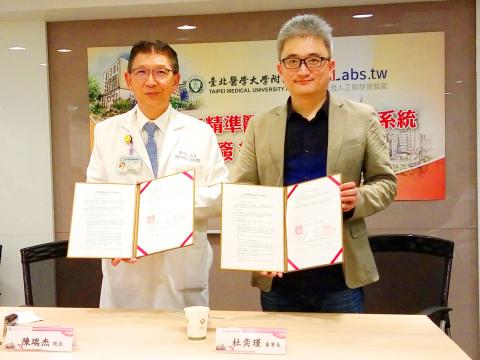Taipei Medical University Hospital on Dec. 7 signed a contract with Taiwan AI Labs to collaborate on introducing an artificial intelligence (AI) system that would provide an earlier warning for sepsis in its intensive care units (ICUs).
The five-year contract with the research organization was signed by hospital superintendent Chen Ray-jade (陳瑞杰) and Taiwan AI Labs founder Ethan Tu (杜奕瑾).
The first phase of the collaboration aims to improve the hospital’s “electronic dashboard” ICU (TED-ICU) by integrating an AI system that could automatically predict the early development of sepsis and alert the resident medical team.

Photo: Wu Liang-yi, Taipei Times
The health conditions of ICU patients can change drastically, and sepsis is a life-threatening condition that occurs in about 437 patients per 100,000 globally, Chen said, adding that studies suggest that sepsis causes about one-third of all deaths in US hospitals.
Previously, sepsis could only be detected after its onset, but after the hospital last year introduced the TED-ICU, medical teams can predict the risk of sepsis about four hours before it occurs, Chen said.
The system works by automatically collecting, integrating, analyzing and keeping a record of ICU patients’ physiological information, the hospital said.
The collaboration with Taiwan AI Labs aims to further improve the dashboard with AI, allowing a real-time alert as soon as it detects the risk of sepsis, hopefully even more than four hours in advance.
Tu said that after his mother passed away from sepsis last year, he began thinking about how to use AI to interpret real-time physiological information to reduce the sepsis mortality rate.
The lab in September developed an AI sepsis detection system and allowed it to learn from the hospital’s data for two months, Tu said, adding that so far, its detection accuracy is at about 85 percent and can hopefully enter clinical use soon.
The hospital said it hopes to introduce AI to learn the medical records of people injured in falls to develop a mechanism to predict high-risk groups for such injuries and to analyze their causes to improve care.

The manufacture of the remaining 28 M1A2T Abrams tanks Taiwan purchased from the US has recently been completed, and they are expected to be delivered within the next one to two months, a source said yesterday. The Ministry of National Defense is arranging cargo ships to transport the tanks to Taiwan as soon as possible, said the source, who is familiar with the matter. The estimated arrival time ranges from late this month to early next month, the source said. The 28 Abrams tanks make up the third and final batch of a total of 108 tanks, valued at about NT$40.5 billion

A group from the Taiwanese Designers in Australia association yesterday represented Taiwan at the Midsumma Pride March in Melbourne. The march, held in the St. Kilda suburb, is the city’s largest LGBTQIA+ parade and the flagship event of the annual Midsumma Festival. It attracted more than 45,000 spectators who supported the 400 groups and 10,000 marchers that participated this year, the association said. Taiwanese Designers said they organized a team to march for Taiwan this year, joining politicians, government agencies, professionals and community organizations in showing support for LGBTQIA+ people and diverse communities. As the first country in Asia to legalize same-sex

Travel agencies in Taiwan are working to secure alternative flights for travelers bound for New Zealand for the Lunar New Year holiday, as Air New Zealand workers are set to strike next week. The airline said that it has confirmed that the planned industrial action by its international wide-body cabin crew would go ahead on Thursday and Friday next week. While the Auckland-based carrier pledged to take reasonable measures to mitigate the impact of the workers’ strike, an Air New Zealand flight arriving at Taipei from Auckland on Thursday and another flight departing from Taipei for Auckland on Saturday would have to

MOTIVES QUESTIONED The PLA considers Xi’s policies toward Taiwan to be driven by personal considerations rather than military assessment, the Epoch Times reports Chinese President Xi Jinping’s (習近平) latest purge of the Chinese People’s Liberation Army (PLA) leadership might have been prompted by the military’s opposition to plans of invading Taiwan, the Epoch Times said. The Chinese military opposes waging war against Taiwan by a large consensus, putting it at odds with Xi’s vision, the Falun Gong-affiliated daily said in a report on Thursday, citing anonymous sources with insight into the PLA’s inner workings. The opposition is not the opinion of a few generals, but a widely shared view among the PLA cadre, the Epoch Times cited them as saying. “Chinese forces know full well that